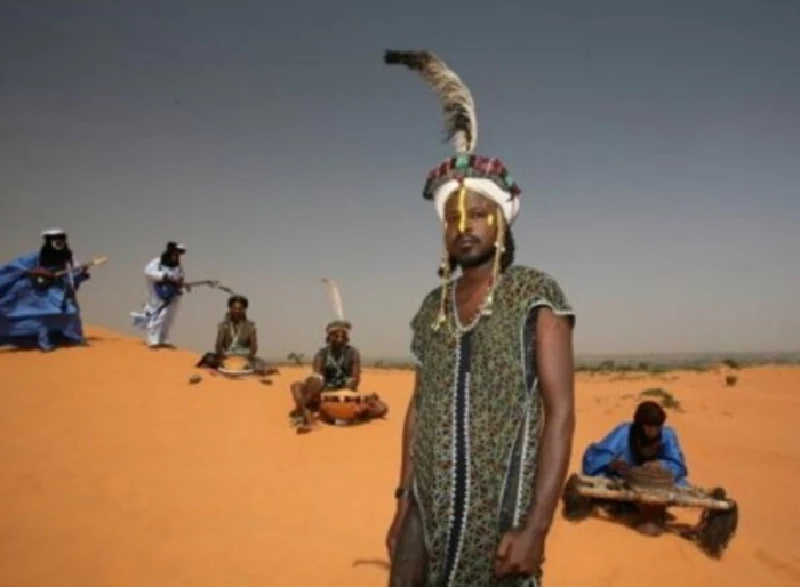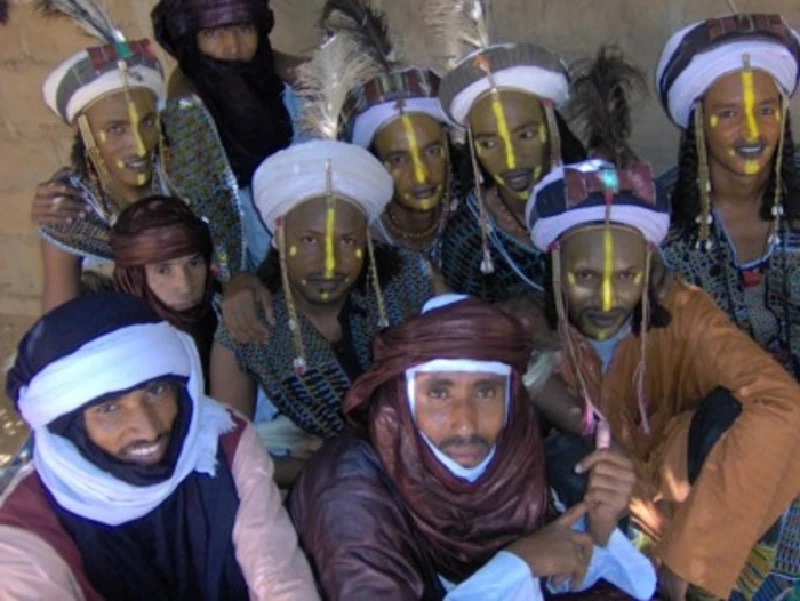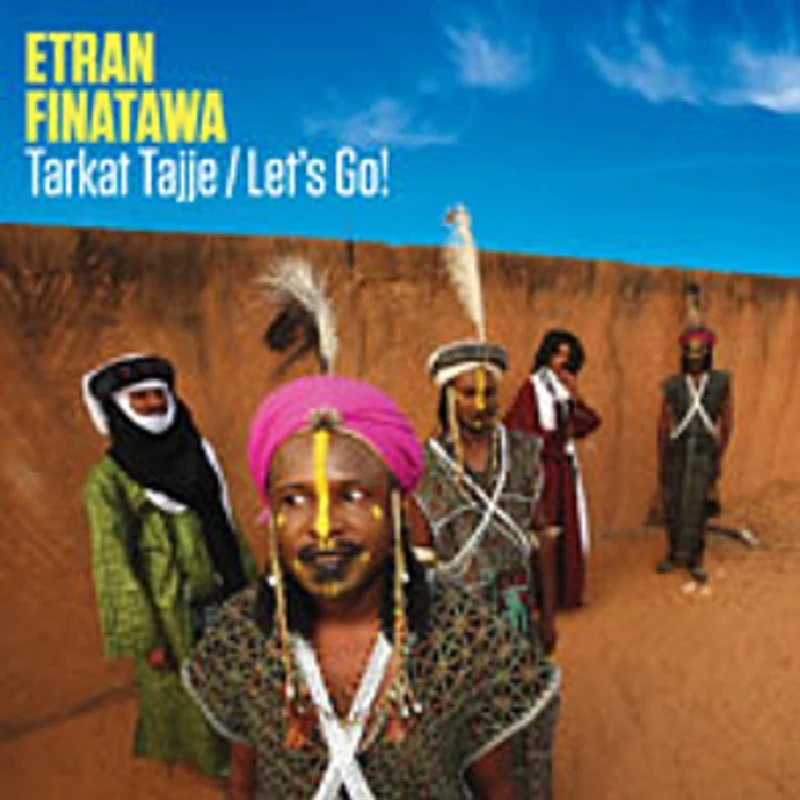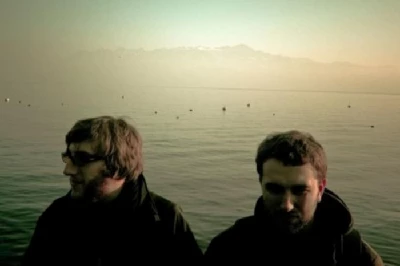Arms and Sleepers - Interview
by Lisa Torem
published: 8 / 7 / 2010

intro
Lisa Torem speaks to Alhousseini Mohamed Anivolla from Niger-based band, Etran Finatawa, who recently recorded their third album, ‘Tarkat Tajje/Let’s Go!’, at Peter Gabriel's Real World Studios
Alhousseini Mohamed Anivolla, Tuareg and author, composer and lead singer and guitarist of Niger-based band, Etran Finatawa, explains why the music and philosophies of his band can neither be compromised nor treated as separate entities. In support of their third release, ‘Tarkat Tajje/Let’s Go!', Etran Finatawa are touring internationally, not merely to entertain new audiences with their unique sound of hypnotic blues and scorching desert fusion, but to spread the important message of their peoples who face constant threats to their proud existence. Formed with members from two distinct tribes, the Tuareg and the Wodaabe, neighbors for centuries, but with disparate musical styles, the band has forged an unprecedented musical identity. Merging modern day Woody Guthrie folk wisdom with spine-tingling guitar riffs and rhythms inspired by Jimi Hendrix and Santana, with their own innate native vocal and instrumental chops, their resultant sound is rapidly gaining international acclaim for its mantra-like exuberance and passionate, political flavouring. The resonant calls of Anivolla, and the responses by the more high-pitched vocalists, Wodaabe members Bammo Agonla and Bagui Bouga, reveal rhapsodic emotion, even though the musicians sing in their native languages. Tuaregs have traditionally used strings, tende drums and riveting ululations since the 70s. Unlike the Wodaabe, they began using the electric guitar as a primary instrument in the 70s. This style is referred to as: “Ichumar.” The calabesse or gourd is used very lightly as a percussive instrument.It’s interesting to note, that while Westerners consider loud applause a gesture of gratefulness, the band engages in a light touching of the palms, during performance, which is much more gentle, yet potent, in offsetting the passionate themes and encouraging audience participation by way of dance and reciprocal chanting and singing. Native dress and make-up is also an important factor in the performance of Etran Finatawa’s music. Anivolla considers each of these elements as crucial to the finished product as the contagious beauty of the music itself. Anivolla speaks to Pennyblackmusic about why their music is distinct and vital. PB: Etran Finatawa started with ten members, but now only five members are recording and touring. Are those original members still involved with the band? AMA: Yes, some of them are still involved with projects with our cultural association. PB: What musical training or experience did each member bring to the band or did you come together, originally, because of your shared vision? AMA: We are all nomads and we share many things. We kept our traditions, for example, and that is very strong. We all are proud of that and that has been the strongest motivation when we came together. PB: In the song 'Imuzaran' the message is, “those who are heading the world pay attention to the tears of the children of this world.” Etran Finatawa’s music has been enjoyed by children all over Niger. The music is hypnotic and beautiful, but do you think the children are aware of the deeper meaning? AMA: Yes, because some of these children have made this experience and they have lost fathers, brothers and other family members in the rebellion. PB: 'Tarkat Tajje/Let’s Go!’was recorded at Peter Gabriel's Real World Studios in Bath. How did producer Colin Bass keep your music balanced and authentic during the recording process in the UK? Was he familiar with the “nomad blues” style that the band has developed, before the project took place? AMA: He is very calm and he took part in the whole production process and treated our music with a lot of respect. He followed the spirit and he was involved in the spirit and the whole process of the production. I think a professional like Colin knows many styles and he knows that he must let it go and develop just following the stream. PB: In 2005, when your debut ‘Introducing Etran Finatawa’ was released, did you feel that North Americans or Europeans, more accustomed to western-style music, would open their minds to something so unique? AMA: Yes, it has been the first time for many people. There is always a first time and many people were curious and ready for something new and unique. PB: Niger is one of the poorest countries of the world, yet the cultural heritage is extremely rich. The fact that the country is located between Berber and Arab cultures of the North and sub-Saharan cultures of the South may have been a factor in the combining of artistic cultures. Were there other factors, though? AMA: The junction is very important. These cultures have been living together for many centuries as well. PB: With ‘Tarkat Tajje/Let’s Go,’ the band is delving more deeply, than before, into your nomadic lifestyle, and the challenges involved in maintaining this lifestyle, despite the constant threats of global influences. How do you stay committed to your way of life and how much strength is derived from your music? AMA: I show my culture to many other people. I show them the importance of culture and, of course, I have to live my culture. What would I be without my culture? PB: In 2007, your second album, ‘Desert Crossroads’ explored these themes, but the new album is more penetrating. Are you committed to singing in the Tamashek and Fulfulde languages or do you see yourselves translating any of your music into English? AMA: Yes, maybe, if I have some ideas in English, I would do so. PB: The songs centre around some deep themes; healing, stars, poverty, isolation, and liberty. You are the first group to use songs of the Wodaabe tribe in a modern context. Etran Finetawa means “the stars of tradition.” In practice it, hwoever, seems that your music has forged a new genre. AMA: Yes! Because bringing together two tribes is already a new creation. PB: The band has toured in Europe, North America, Africa and the Pacific extensively. Where have you received the most favourable reactions? AMA: In Lisbon in Portugal. PB: Alhousseini, you wear traditional clothing and make-up when performing. In contrast, many American and European bands are very casual in their dress. Does this surprise you? AMA: No, because this is their tradition. But I don’t like African musicians in jeans and T-shirts as they have all these rich garments. PB: Do you think that “nomad blues” share any characteristics with American blues? AMA: Of course, there are many similarities because the origin of blues is in Africa. PB: Thank you, Alhousseini.
Picture Gallery:-


interviews |
|
Interview (2010) |

|
| Arms and Sleepers are a Massachusetts-based band whose music is an amalgamation of psot rock, trip hop and electro. New Pennyblackmusic writer Magadalena Majchrzak speaks to Mirza Ramic from the group about the influence of film soundtracks on their music |
most viewed articles
current edition
Carl Ewens - David Bowie 1964 to 1982 On Track: Every Album, Every SongArmory Show - Interview with Richard Jobson
Colin Blunstone - Thalia Hall, Chicago, 16/7/2025
Bathers - Photoscapes 1
Visor Fest - Valencia, Spain, 26/9/2025...27/9/2025
John McKay - Interview
Billie Eilish - O2 Arena, London, 10/7/2025
Robert Forster - Interview
Sir Tim Rice - Interview
Loft - Interview
previous editions
Heavenly - P.U.N.K. Girl EPManic Street Preachers - (Gig of a Lifetime) Millennium Stadium, Cardiff, December 1999
Beautiful South - Ten Songs That Made Me Love...
Pixies - Ten Songs That Made Me Love...
Oasis - Oasis, Earl's Court, London, 1995
Prolapse - Interview
Trudie Myerscough-Harris - Interview
Paul Clerehugh - Interview
Doris Brendel - Interview
Simon Heavisides - Destiny Stopped Screaming: The Life and Times of Adrian Borland
most viewed reviews
current edition
Sick Man of Europe - The Sick Man of EuropeLucy Spraggan - Other Sides of the Moon
Amy Macdonald - Is This What You've Been Waiting For?
Phew, Erika Kobayashi,, Dieter Moebius - Radium Girls
Davey Woodward - Mumbo in the Jumbo
Bush - I Beat Loneliness
Alice Cooper - The Revenge of Alice Cooper
Blueboy - 2
Cynthia Erivo - I Forgive You
Suzanne Vega - Flying With Angels
Pennyblackmusic Regular Contributors
Adrian Janes
Amanda J. Window
Andrew Twambley
Anthony Dhanendran
Benjamin Howarth
Cila Warncke
Daniel Cressey
Darren Aston
Dastardly
Dave Goodwin
Denzil Watson
Dominic B. Simpson
Eoghan Lyng
Fiona Hutchings
Harry Sherriff
Helen Tipping
Jamie Rowland
John Clarkson
Julie Cruickshank
Kimberly Bright
Lisa Torem
Maarten Schiethart